DINASTI SOON
DALAM ATM
Ketika melayari facebook Tentera Darat Malaysia, aku terbaca
salah satu komen/entri oleh pembaca yang menulis bahawa tidak ramai (peratusan
rendah) etnik bukan Melayu dalam Angkatan Tentera Malaysia (ATM) adalah
berpunca dari sikap kurang bersifat patriotic dan tiada semangat untuk
mempertahankan Negara.
Dalam tulisan ku sebelum ini yang bertajuk FAMILY OF
STEVENSON aku ada menyatakan pendapatku yang tidak bersetuju dengan kenyataan
seperti di atas. Banyak bukti aku tunjukkan untuk menyokong pendapatku. Selain
dari kesah Keluarga Stevenson dan menyelitkan kewujudan keluarga Chan (laksamana Pertama Chan Peng Cheong) dalam ATM,
aku juga memaparkan kesah keberanian pahlawan-pahlawan bukan Melayu (khususnya
bangsa Cina) yang sanggup menggadai jiwa dan raga untuk melawan Jepun dan juga
pengganas komunis (emergency campaign) serta menyerlahkan keberanian semasa
berkhidmat di bawah panji PBB (UNO) di luar Negara seperti Kol Maurice Chan PGB,
Mej Lee Ah Pow PGB, Lt David Fu PGB dan Sjn Choo Who Soon PGB.
Perkembangan ekonomi semasa, kelemahan sistem pendidikan kita
serta beberapa kelemahan dalam pengurusan ATM yang menjauhkan jarak mereka
(etnik bukan Melayu) dari menyertai ATM.
Ketika menelusuri tepian pantai dan melayari bahtera
internet, aku menemui satu websait milik PERSATUAN VETERAN CINA ATM (PVCATM) atau MAF CHINESE
VETERANS ASSOCIATION (MAFCVA) yang menyediakan pelbagai artikel sejarah kepahlawanan
Veteran Cina ATM, khususnya di zaman Dharurat. Dalam websait itu aku mendapat satu cerita baru tentang satu keluarga Tionghua yang berhijrah ke Tanah Melayu dan menyerahkan hampir seluruh ahli keluarganya kepada ATM untuk berbakti kepada tanah airnya, yang bukan Republik Rakyat China bukan China Taipei, bukan Hong Kong dan bukan juga Macau TETAPI Malaysia.
Logo PVCATM (MAFCVA)
Artikel yang menarik perhatianku ini ditulis oleh Lt Soon Tet Leong TLDM (Bersara) bertajuk FAMILY HOMELAND ini menceritakan perihal keluarga SOON AH YONG yang berhijrah dari Guangdong Tanah Besar China di awal tahun 1800an untuk mencuba penghidupan baru di Semenanjung Tanah Melayu (Malaya). Pelayaran Soon Ah Yong ke Malaya adalah untuk lari dari himpitan ekonomi dan politik di China ketika itu mencari penempatan sementara namun ia berakhir dengan keputusan untuk menetap di Malaya.
AKU INGIN MEMOHON KEIZINAN PENULISNYA untuk menyalin semula kesah mereka dalam blog aku supaya dapat dibaca lebih ramai lagi pembaca di kalangan bangsa Melayu agar mereka tidak memandang negatif ke atas semangat patriotik sebahagian etnik China terhadap tanah air baru mereka Malaya yang kemudiannya menjadi MALAYSIA. Bagaimanapun aku tidak mengambil semua gambar dalam websait itu untuk menghiasi blog ini. Aku hanya memilih beberapa sahaja.
Kebetulan, Soon Tet Leong dan isterinya Lt Kol Loo Lee Fum (Bersara) pernah tinggal berjiran denganku (masa itu berpangkat Kapt/Mej) semasa aku tinggal di OMQ Blok JKR Lorong Golok (Kem KEMENTAH) antara 1993 - 2006.
Suatu waktu nanti, aku akan menterjemahkan artikel ini dalam Bahasa Melayu.
BACALAH KESAH MENARIK INI.
AKU INGIN MEMOHON KEIZINAN PENULISNYA untuk menyalin semula kesah mereka dalam blog aku supaya dapat dibaca lebih ramai lagi pembaca di kalangan bangsa Melayu agar mereka tidak memandang negatif ke atas semangat patriotik sebahagian etnik China terhadap tanah air baru mereka Malaya yang kemudiannya menjadi MALAYSIA. Bagaimanapun aku tidak mengambil semua gambar dalam websait itu untuk menghiasi blog ini. Aku hanya memilih beberapa sahaja.
Kebetulan, Soon Tet Leong dan isterinya Lt Kol Loo Lee Fum (Bersara) pernah tinggal berjiran denganku (masa itu berpangkat Kapt/Mej) semasa aku tinggal di OMQ Blok JKR Lorong Golok (Kem KEMENTAH) antara 1993 - 2006.
Suatu waktu nanti, aku akan menterjemahkan artikel ini dalam Bahasa Melayu.
Rujukan:
BACALAH KESAH MENARIK INI.
HOMELAND
Our story started when Soon Ah Yoong had sailed to Malaya from Guangdong, China in the 1800’s. He had intended a “temporary migration” to escape the political and economic situations back home but had instead settled down for good in this country eventually. Ah Yoong had stayed put where he had first landed - Bukit Mertajam, Province Wellesley, Malaya. Our family ancestral records show that our “Soon” family line in Malaya started off from this very Soon Ah Yoong in his newly adopted homeland - Malaya.
Our story started when Soon Ah Yoong had sailed to Malaya from Guangdong, China in the 1800’s. He had intended a “temporary migration” to escape the political and economic situations back home but had instead settled down for good in this country eventually. Ah Yoong had stayed put where he had first landed - Bukit Mertajam, Province Wellesley, Malaya. Our family ancestral records show that our “Soon” family line in Malaya started off from this very Soon Ah Yoong in his newly adopted homeland - Malaya.
In a quick summarised narration, which had been handed down
by word of mouth from the old to the young throughout the years, Soon Ah Yoong,
born circa 1790 and died in 1862, is the apex for the Soon family in this
country. He is listed supremely as Generation One. Ah Yoong is buried in Kubang
Semang, Bukit Mertajam. His only son, Soon Kuan Hin born in 1821, is Generation
Two. Soon Kuan Hin had three Generation Three sons - Soon Seng Lee born in 1864 (was also
known as the Soon Ah Lee of the Lunas, Kedah fame), Soon Seng Kee born in 1869 and
Soon Seng Chiew born in 1873.
My great grandfather, Seng Kee the second born, is our
third generation patriarch, and he had seven children (three sons and four
daughters). My grandfather, Soon Kim Fook was the second born on 14th July
1893, is listed as Generation Four. (The graves of Kuan Hin, Seng Lee, Seng Kee
and Kim Fook all still exist till this very day located in Kubang Semang, Bukit
Mertajam). My late father, Soon Boon Sooi, the second born on 20th May 1919,
continued as Generation Five and I, Soon Tet Leong born on 8th February 1951,
belong to a very large and broad 6th Generation grouping. My sons, Kenneth Soon
Pow Lee born 28th February 1982 and Lionel Soon Pow Yik born on 28th February
1986 belong to the 7th Generation category. My granddaughter, Hela Soon Yu Hui
born on 10th April 2018, continues as the 8th Generation Soon in Malaysia.
This writer has often identified himself as a “6th
Generation Immigrant” whenever questioned on ancestry, nationality, race or
loyalty; he wonders - when do immigrants lose those “immigrant, Chinese or
pendatang” tags, or after which generation of citizenry is one considered
totally assimilated and by whom? Will we ever be dispensed with the “Chinese or
Indian or Malay” tags in Malaysia? Can we not be simply insulted or labelled
just a Malaysian? What does one have to do to prove oneself loyal and
submissive to our beloved homeland?
LOYALTY
During WW II, the Japanese imperialists were truly
ruthless. It had been widely reported that the Chinese Diaspora, in whichever
country the Japanese had conquered, were summarily executed by mere suspicions
of the Chinese assisting any resistance groups. The atrocities of the Japanese
in China and the Korean Peninsula had filtered down to send shivers to the
other regional Chinese Diaspora, long before the Japanese had reached the
shores of Malaya or Singapore.
Despite these concerns, and answering to the calls for
Malayan youths to enlist to help defend the country, two 5th Generation
brothers, Soon Boon Leong born 17th November 1917 and Soon Boon Sooi born 20th May
1919 (the eldest and 2nd born respectively) enlisted in the Royal Army Medical
Corps (RAMC) to help defend the nation. While in the RAMC, they had met and
made friends with Hoo Eng Chong, who was born on 18th July 1922, he eventually
married the brothers’ sister, Boon Foong born on 19th May 1922. The three of
them enlisted at different times but underwent training together at the Tanglin
Barracks in Singapore. Their training involved physical exercises, parade
ground drills, and lectures in anatomy, physiology, hygiene and sanitation,
first aid and wounds.

Generation 5 – Late Soon Boon Leong in 1987
The Japanese forces had landed in Malaya at midnight of 8th
December 1941. At day break, they had already taken control of Kelantan and
Kedah. The speed and rapid advances of the Japanese Occupational Forces
compelled the Allied Forces to retreat the only way they could - southwards.
Malaya fell to the Japanese after the Allied Forces withdrew to Singapore, and
thereon began the three years Japanese Occupation of Malaya.
What the two brothers and future brother-in-law had learnt
during their training was immediately put into practical use. Trains were still
running to and from the mainland battlegrounds; the British organized ambulance
train services across the Straits of Johor and the Tanjong Pagar railway
station in Singapore. Boon Leong was assigned as an ambulance driver, while
Boon Sooi and Eng Chong were receiving and clearing casualties at the railway
station and the military hospital.
Boon Leong was making ambulance runs into Peninsular Malaya
itself. He had related his experience in one of his many educating the young
episodes - "In my life I have not seen so much blood. If blood flows like
river, that day was the closest one I've ever seen! Till this day, I cannot
bring myself to take Marmite ever again, because the thing smells like
blood."
The order had already been issued to all allied forces in
Peninsular Malaya to pull back to Singapore. By 7th January 1942, the Japanese
had already crossed the Johor Straits. Allied positions fell while others were
quickly outflanked.
Boon Sooi had recalled, "Day and night, loud
explosions were heard, and these were not direct results of the Japanese
bombardments but the Allied Forces were busy destroying their own ammo dumps,
fuel storage tanks and even their food storage facilities. The whole sky was
blackened in thick smoke."
On 15th February 1942, the British surrendered to the
Japanese. Boon Leong and Boon Sooi were already prisoners of war (POW) in
Singapore as a result of the surrender. They had no idea where or how the other
was (neither were the defeated and humiliated British, as anyone would have
guessed), but both Boon Leong and Boon Sooi were eventually released
(surprisingly paroled) after a short spell of interrogation while still in
captivity. Boon Sooi had even related the facts of his captivity to his
children, “Japanese soldiers were truly smaller in size when compared to most of
the POW’s that were paraded daily, however, a pint sized Japanese Officer’s
forceful slap to the face easily felled or spun the POW’s around. He truly
understood what seeing stars meant after that experience!” On their release,
they separately made their way towards home up north from Singapore, on foot
joining many others following the railway tracks.
Boon Leong fell ill along the way and ended up homed around
Kuala Lumpur for a period of time. Incidentally, Boon Leong who was a trained
agriculturist in Serdang, Selangor became a planter and was employed as the
General Manger of Nyalas Estate, Jasin Malacca during the Emergency Period. He
had his hands full during the insurgency, as the communist were targeting
plantations all over. He was always armed for his safety and had worked
alongside the government to help counter the insurgency.
Emergency Period – Soon Boon Leong (foreground planters rig
strapped with a revolver) British High Commissioner visit to set up defence
against communist infiltration to the village. Boon Leong’s estate quarters was
the most suitable meeting place, also attended by Tunku Abdul Rahman.
Boon Sooi managed to make it all the way home to Bandar
Baharu, where his family was then located. Bandar Baharu is a town located
along the Kedah-Penang–Perak borders. Soon Boon Chin born 13th March 1928, his
youngest sister who still commands some good memories despite being 90 years
old, described her brother on that day, "He was so dirty, his uniform all
in tatters, and he had aged beyond the years! We burnt his uniform for fear of
him being recaptured by the still lurking Japanese soldiers". Boon Sooi
was then employed as a First Class Hospital Assistant in Bertam Estate, Kepala
Batas until his full retirement. He assumed the role of the Medical Doctor for
the entire Estate (British owned Empevan) throughout his service, qualified
doctors were very scarce and they only make periodical visits to review once a
week if not fortnightly.
To digress a little, it must be pointed out here that it
was very uncommon for ladies to be educated in the 1940’s, leave alone being
English educated. Surely, it is another story when a Chinese lady was employed
with the Police Force. Boon Chin was the stenographer to the British Chief
Police Officer (CPO) for Kedah and Perlis during the Emergency Period, and
later with the Polis DiRaja Malaysia (PDRM) until she retired in 1983. In the
days of old when computers and storage chips were not yet invented,
stenographers were just equivalent to uniform or signals and radio operators,
they were custodians and were all sworn to secrecy and extreme loyalty - they
record minutes, typed correspondences, filed records and took notes of
everything operational and sundry. 90 year old retiree Boon Chin still holds on
to that oath till this day.
Back to the loyalty story, Hoo Eng Chong remained as a POW,
and in June 1943 was dispatched by train to Siam. He was one of thousands who
were forcibly recruited by the Japanese army to work on the Death Railway
during WWII, and had survived.
Years later after my dad passed away, and on inquiring for
more details related to my dad’s services in the RAMC during the Japanese
Occupation of Malaya, the UK Ministry of Defence had responded as follows:
“….the record shows that your father was posted as missing at the time of the
allied surrender of Singapore in February 1942. The next entry dates from July
1946. He is shown as formally discharged on 10th July 1946. I regret that his
records do not confirm any details of your father’s actions for the period from
early 1942 until his discharge in 1946.” I had wondered how British records
were kept intact in Malaya during the war, more so if they were the defeated
forces.
That being stated, all three were eventually reunited as a
family after the war; they had re-joined RAMC when the British regained control
after the Japanese had surrendered, only to then leave honourably from the
RAMC, with their Cause of Discharge from the RAMC listed as follows – “Services
no longer required for purpose for which he enlisted.” The Medals listed for
them were 1939-1945 Star, Pacific Star and War Medal.
After Boon Leong and Boon Sooi, the family tradition of
Soon’s serving the nation continued through their children. Both Boon Leong and
Boon Sooi had passed on in 1988, six months apart from each other.
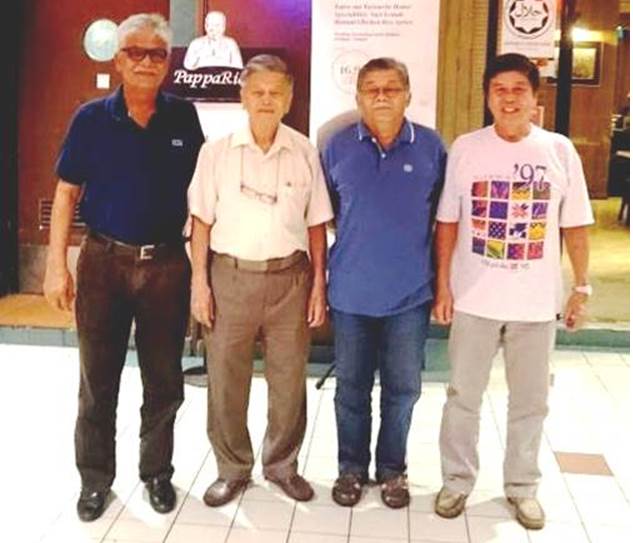
CNY Feb 2018 – The Children of Boon Leong and Boon Sooi -
Tet Leong, Tet Loy, Tat Kong and Tet Seong
Capt Soon Tet Loy RMN (Retired)
Captain (Capt) Soon Tet Loy RMN (Retired), the eldest son of Soon Boon Leong, was born on 21st July 1936 in Kuala Lumpur; he is incidentally the eldest offspring in the entire 6th Generation Soon family line. He completed his education and the Higher School Certificate in Bukit Mertajam High School in 1955. He had then joined the Royal Malayan Navy (RMN), on 1st April 1956.
He had joined as a Regular Service Commission Officer, and
was the second batch of naval cadet officers (soon after Tan Sri Admiral
Thanabalasingam’s first golden batch) to be despatched for overseas naval
training. On completion of his initial cadet training in Singapore, he was
packed off to Britannia Royal Naval College (BRNC) to commence Seamanship
training from 6th January 1957 until 7th April 1959; he was re-categorised from
the Executive to the Engineer Branch in the Navy on 13th January 1959. He
received his Sub-Lieutenant (Sub-Lt) commission on 1st November 1960. Training
continued for him at the Royal Naval Engineering College (RNEC), Manadon
Plymouth in Devon until 29th June 1963. He acquired his Engineer Officers
Watchkeeping Certificate and Certificate of Competency (COC) in September 1960
on-board HMS LOCH KILLSPORT. He was promoted Lieutenant (Lt) on 1st January
1962.
Incidentally, Tet Loy had many firsts in his career. He was
the first ever Malayan Naval Officer to be admitted into the RNEC. He was the
first Naval Engineer Officer. He was also the first Malaysian Chief Staff
Officer Technical taking over from the British. He was the Commandant of TLDM
Sungei Nyior. He was General Manager RMN Naval Dockyard Nucleus Team. But, the
most prestigious and notable appointment for him was when he was appointed,
starting initially as the Deputy before becoming the very first Inspector
General of the RMN Naval Inspectorate General Organisation, a totally new set
up in 1987.
His appointments throughout his naval career were as
follows:
(1) BRNC & RNEC 1956-1963
(2) Patrol Craft Engineer Officer 1963 – 1964
(3) KD MALAYA Chief Technical Officer 1964 – 1966
(4) KD HANG TUAH – Chief Engineer Officer 1966 - 1968
(5) NAVAL STAFF DIVISION (NSD) as Staff Officer 2
Technical 1968 – 1969
(6) COMNAV WEST Chief Staff Officer (Technical) 1969 –
1972
(7) TLDM SUNGEI NYIOR – Commandant 1972 -1977
(8) NSD – Lumut Base Project Officer 1977 – 1978
(8) NSD – Lumut Base Project Officer 1977 – 1978
(9) NSD – Head Lumut Base Progress Planning 1978 – 1981
(10) Malaysian Shipyard Engineering – On loan to shipyard
1981 – 1982
(11) RMN NAVAL DOCKYARD – General Manager 1982 – 1984
(12) FLEET MATERIAL COMMAND (FMC) – Panglima FMC 1984 -1987
(13) NSD – Deputy Inspector and Inspector General RMN 1987–
1991
Capt Soon Tet Loy (RMN) retired from the Navy in 1991 after
35 years’ service. He was awarded the KAT, KMN, AMN, PPA and PPM medals. As
second career after the Navy, Tet Loy joined Muhibbah Engineering (M) Bhd as
the Assets Manager and he remained in this job until he retired again on 21st
July 2001.
He was an avid sportsman throughout his career in the
service. In athletics, he participated in pole-vault while in the games
category he played badminton and golf representing the Navy. A story goes
amongst the older Navy folks was that left handed Tet Loy, then Engineer
officer of KD HANG TUAH, had commenced a heaving line transfer at the
forecastle by using a wedge golf club to pitch the heaving line across to the
jetty – and successfully collected at the receiving end.
701767 Sergeant (Sgt) Soon Men Siong RMAF (Retired)
Sgt Soon Men Siong RMAF was born on 11th December 1946; he
is the younger brother to Capt Soon Tet Loy RMN and the 3rd son of Boon Leong.
He had joined the Royal Malaysian Air Force (RMAF) on 31st March 1966 and
received his basic training at the Taiping base. He qualified (through his
training in the Royal Air Force Base Seletar, Singapore) and served throughout
as an RMAF Aero Fireman.
After completing a full service of 21 years in the RMAF,
Men Siong retired as a Sgt on 31st March 1987. He was then gainfully employed
as a Security Executive in the Genting Highlands, Pahang in a second career for
another 19 years. He ceased working at the age of 60 years.
Sgt Soon Men Siong RMAF passed away on May 2017 soon after
his 70th birthday. He was accorded a proper Veteran’s farewell with the
send-off organised and executed jointly by the Malaysian Armed Forces Chinese
Veterans Association (MACVA) and Persatuan Veteran India Angkatan Tentera
Malaysia (PERIM).
200956 Soon Tet Khooi - Royal Military College (RMC),
1966-1969
Soon Tet Khooi born on 6th June 1949 is the eldest son of
Boon Sooi. He had received his early education at Kepala Batas Primary and
Secondary Schools after which he was successfully selected to join the Royal
Military College (RMC) in the 1966-1969 intake.
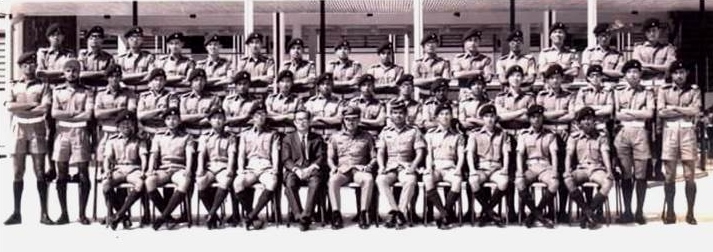
RMC 1966 – 1969, Soon Tet Khooi (Rear row - 1st from
right)
On his exit from the RMC, he was successfully selected into
another category of the uniform services – as a Pilot in Malaysia Singapore
Airlines (MSA) in 1970, however, after Malaysia and Singapore had separated as
a nation, MSA was broken up into two entities - Malaysia Air Systems (MAS) and
Singapore International Airlines (SIA) - he was absorbed full time into the
SIA. He eventually retired as Captain from the SIA in 2004.
Malaysia Singapore Airline (MSA) and then Singapore
International Airlines (SIA).
He was a certified golf coach since 1978; and is today the
Director of Golf Instruction RinavAGolf, training young aspiring golfers in
Malaysia.
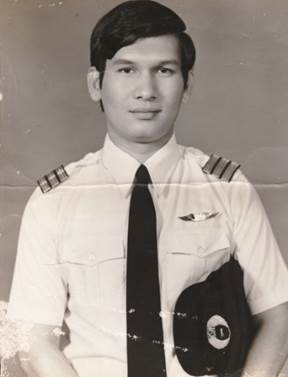
SIA Capt Soon Tet Khooi 2018
Lt Soon Tat Kong RMN (Retired) N/401956
Soon Tat Kong, born on 23rd October 1950, is the younger
brother to Capt Soon Tet Loy RMN and the fourth son to Boon Leong. He received
his early schooling in Jasin, Melaka and then his secondary education in St
Marks Secondary School in Butterworth. From the Tunku Abdul Rahman College,
Kuala Lumpur he decided to join the Royal Malaysian Navy in May 1969, when
Malaysia was then in the middle of the May 13 racial riots.
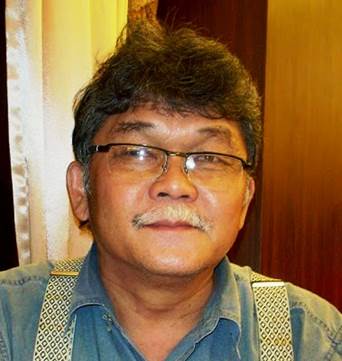
Soon Tat Kong
Tat Kong graduated as a Controls Electrical Artificer (CEA) in 1974, at the Naval Electrical School in HMS Collingwood, Portsmouth United Kingdom. He spent the initial year at HMS Fisgard in Plymouth in 1969 where he graduated by capturing The Most Prestigious “Captain’s Prize”.
He was also awarded the Plymouth’s Command Certificate for
Playing Hockey for the Plymouth. He had represented HMS Fisgard in indoor
hockey and badminton. He was also awarded the Portsmouth Command in Hockey and
represented the Royal Navy under 23 in Hockey in 1973.
On his return from the United Kingdom in 1974, he was
assigned to various naval shore establishments and ships. He was commissioned a
Regular Special Duty Officer after serving 11 Years in the RMN. His final eight
years in the navy was with the RMN Naval Dockyard as an Assistant Workshop
Manager looking after the Exocet MM38 Missiles, the Vega Pollux System, the PAP
underwater unmanned submersible and the NAJA Laser Optical System. He served
the RMN for a total of 21 years before retiring.
Tat Kong lamented that recognition and rewards in the Royal
Navy were better organised and managed; he had not received any awards in his
21 years of service in the RMN. He had participated actively and
representatively in hockey for the Malaysian Armed Forces (State Level hockey)
and squash for the Navy. He noted that he had also been sailing competitive
Optimist and 470 sailboats and sailboards for the Navy for over 10 Years. He
was even a qualified Ship’s Diver and served as the Diving Officer for the RMN
Naval Dockyard.
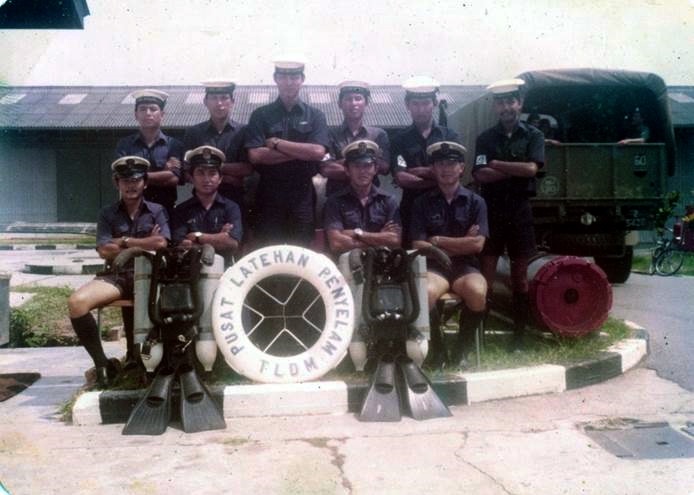
RMN Ships Diver Training – Tat Kong seated first left.
On retirement in 1990, he was employed in several
manufacturing organizations serving in various capacities ranging from a Plant
Engineer, Factory Manager to General Manager. In 1992, he was actively involved
in an International Consultancy, managing productivity and quality related
projects in Indonesia, Singapore, China and Malaysia.
Tat Kong obtained his Masters in Engineering Degree
(Engineering Management) from the prestigious University of South Australia in
Adelaide. He is the Co-Founder of JTF Quality Management Consultancy firm
specializing in productivity and quality management, offering consultancy and
training services in areas such as TQM, TPM, Kaizen, Poka Yoke, CIT, ISO 9001,
process reengineering, JIT, 5S, SMED, SPC, cost reduction, RCM and project
management. Due to his involvement and contribution in assisting the Dublin
Metropolitan University in their MBA Program Project Management and TQM, both
in Malaysia and Singapore, he was awarded the Honorary Doctor of the University
with the use of title Dr over his name.
Tat Kong has been in the Consultancy and Training Business
for over 20 years and he has provided his services to over thirty six
organizations, ranging from small factories to multi-nationals such As Caltex
and Fuji Xerox. Currently, Tat Kong is the Principal Consultant in his own firm
- Titan Consultancy Sdn Bhd - providing Consultancy and Training Services in
Malaysia, Philippines and Indonesia.
Lt Soon Tet Leong RMN (Retired) N/401733
Soon Tet Leong, born on 8th February 1951 is the 3rd son of
Boon Sooi. He received his early education in Kepala Batas Primary and
Secondary Schools. He undertook his Lower and Upper Six education at the Bukit
Mertajam High School.
He had joined the Royal Malaysian Navy (RMN) on 8th May
1970 and was selected to be trained in a three and a half year Naval Artificer
Apprenticeship Course at the Royal Australian Navy Apprentice Training
Establishment (RANATE), HMAS NIRIMBA, New South Wales Australia.
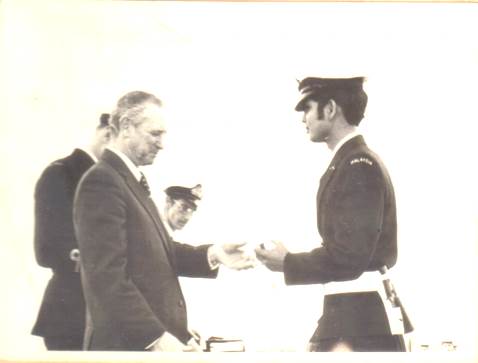
Passing Out Parade HMAS NIRIMBA, NSW Australian Oct 1973
On his return from Australia, his services continued in the
following appointments:
(1) Fleet Technical Services as Technician in various Departments – KD Hang Tuah (1973–1977)
(2) Chief Technician as Staff Maintenance
Authority, Fleet Technical Services, Singapore (1977–1979)
Soon Tet Leong was commissioned on 15th October 1979 after 9 years
service.
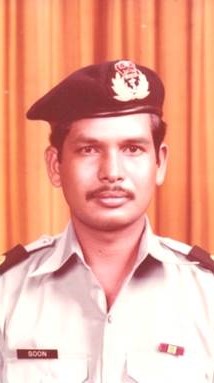
October 1979 - Sub-Lt Soon Tet Leong
After being commissioned he worked as:
(1) Staff Officer (SO) Grade 3 Maintenance,Technical Directorate, RMN Dept, Ministry Of Defence (1979–1981).
(1) Staff Officer (SO) Grade 3 Maintenance,Technical Directorate, RMN Dept, Ministry Of Defence (1979–1981).
(2) Project Officer (cum Staff Officer Maintenance, MAWILA1, Kuantan (1981–1984).
(3) Defect List Production Officer – Fleet Material Command HQ, Lumut (1984 –1985).
(4) DOCKMASTER of the RMN Naval Dockyard, Lumut (1985-1989).
(4) DOCKMASTER of the RMN Naval Dockyard, Lumut (1985-1989).
(5) SO 2 Technical (Head of Operations) in Malaysian Armed Forces Cataloguing Authority (MAFCA), MINDEF (1989–1992).
Tet Leong chose optional retirement in 1992 at 40 years of age.
Tet Leong chose optional retirement in 1992 at 40 years of age.
While in service, Tet Leong had continued the family
tradition in participating representative sports throughout his naval career.
He received sports colours from the Royal Australian Navy for Tennis and
Hockey. In the RMN, he was awarded Sports Certificate and colours for hockey
and cricket.
Tet Leong, an Incorporated Marine Engineer registered with
the Engineering Council United Kingdom, opted out for early retirement from the
Navy in January 1992 and was actively employed in various capacities from
Manager, Senior Manager, and General Manager to Executive Director in the Oil
& Gas Pipeline Intelligent Pigging profession and industries. He went into
a full retirement in 2015, and now golf regularly to continue the love for
sports.
Tet Leong is married to Lt Col Carol
Loo Lee Fum (Retired) of the Royal Intelligence Corps in Dec 1980 and they
have two sons Kenneth Soon and Lionel Soon.
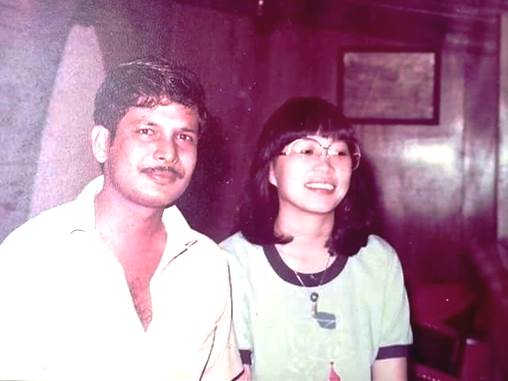

Soon and Loo at MINDEF Central Officers Mess 1980
803381 Chief Petty Officer Soon Tet Kah RMN
Soon Tet Kah was born on 22nd June 1952. He is the eldest
son to Soon Boon Siew, born on 23 April 1924, a much younger brother to Boon
Leong and Boon Sooi.
Another digression, this time touching on a different way
to serve the nation - Boon Siew was the Government’s Chinese Liaison Officer to
the New Villages in Kedah and Perlis during the Emergency Period, after which
he was appointed as the Assistant District Officer of Baling. He had retired
after sitting as a Magistrate for the Kedah state in his last appointment. He
was continuously armed for his own safety and protection against the communists
during the Emergency and after.
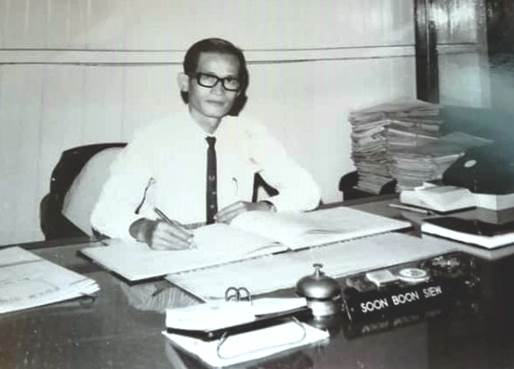
1978 - Magistrate Soon Boon Siew
Tet Kah had joined the Royal Malaysian Navy on 8th May 1970
and was selected to be trained in a three and a half year Naval Artificer
Apprenticeship in the Royal Australian Navy Apprentice Training Establishment,
HMAS NIRIMBA, New South Wales Australia. Tet Kah was trained initially as a
Shipwright but was later re-categorised an Engine Room Artificer (ERA or Marine
Technician Propulsion - MTP).
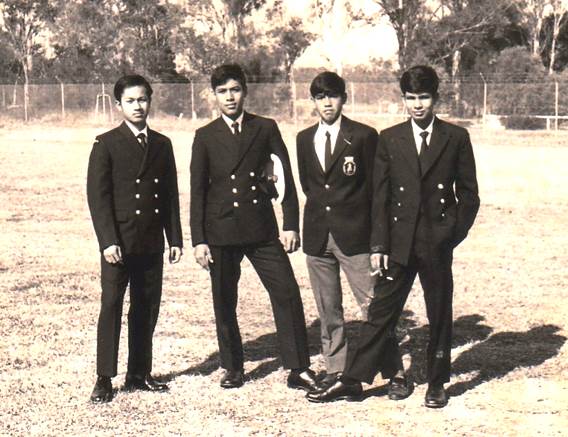
1971 HMAS NIRIMBA – (From left to right) Tet Kah, Roslan,
Shabudin, Tet Leong.
On his return from Australia, he served in various ranks
and capacities. His main job throughout was - to remain responsible to the
Commanding Officer for the proper operation, maintenance and repair of main and
auxiliary machineries onboard ships and shore establishments namely, main
engines, generators, pumps, compressors, steering gear system, ship fluid
systems. He was also required to provide technical support and act as an
overseer for vessels under repair at dockyards.
Tet Kah had served in KD MALAYA, KD HANG TUAH, KD SRI
MELAKA, KD SRI PERAK, KD KERAMBIT, KD BAUNG, KD TAHAN, Lumut Naval Base and KD
SRI LABUAN.
He left the navy as a Chief Petty Officer (CPO) on
completion of his 13 years’ service. Immediately after a short break he took up
a job from 1984 -1985 as a Machining Technician in the German-Malaysia
Precision Company. This job involved the skills he had acquired while in the
navy - operation of precision machining equipment in the manufacture of
fastenings and components for industrial/domestic usage.
From 1985-1989 he was employed as the Final Testing
Supervisor with Zahnrad Fabrik Friedrichshafen Steering which involved the
testing of rack and pinion steering assembly for the automotive industry.
In 1989-1990 he was employed as a Senior Technician with
Tunku Abdul Rahman College as an Instructor for workshop and machine shop
technology.
His final vocation, before his second retirement in 2016,
was as Mechanical Technician with ExxonMobil Exploration and Production
Malaysia Inc (EMEPMI). His job on offshore oil and gas platforms involves the
maintenance and repair of revolving and reciprocating equipment onboard, namely
turbo machinery, pumps, compressors, diesel engines, cranes, pneumatic and
hydraulic systems.
Lt Soon Tet Seong RMN (Retired) N/402000
Soon Tet Seong was born on 29th May 1953; he is a younger
brother to Capt Soon Tet Loy RMN and Lt Soon Tat Kong RMN. Tet Seong had joined
the RMN on 1st March 1971 before he completed his 18th birthday. On enlisting,
he was sent to HMS Fisgard in April 1971, despite being under aged and not yet
eligible to enter the Royal Navy Tiffin Club’s bar, but such enlistments were
then allowed for, more so for long haul apprenticeship training.
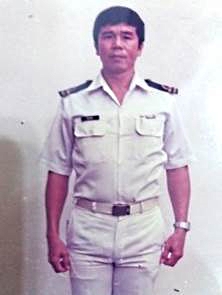
Soon Tet Seong
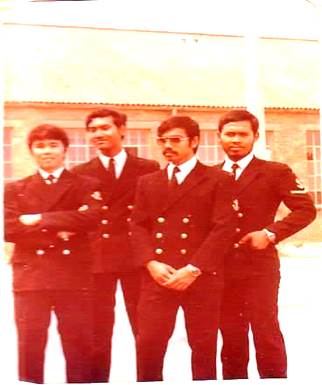
Tet Seong in HMS FISGARD – April 1971
His first training assignment was the Ten Tors 26 km march with full backpack, he came in first and was awarded the “Seaman knife”.
Tet Seong while undergoing his Naval Apprenticeship (Radio
Electrical Artificer) training in HMS Collingwood had volunteered and
participated in the Naval Brass band. This brass band had numerous engagements
marching through towns where Her Majesty the Queen Elizabeth had also visited.
In 1973, he had served onboard HMS APOLLO of the Royal Navy
(RN); the RN ship was in the forefront and engaged in the Icelandic War against
fishing craft supported by the Icelandic Patrol Crafts. In one of the
confrontation, after waves from HMS APOLLO splash over the Icelandic Patrol
Craft, one of their crew who was welding on the upper deck was inadvertently
electrocuted. HMS APOLLO was rammed in retaliation causing a massive hole at
the starboard side of the vessel. A huge pile of the HMS APOLLO crews’
belongings were washed overboard in this incident. An advisory from the British
Intelligence had quickly pointed out that all foreign trainees were not to be
involved in that war, Tet Seong and a number of others were subsequently flown
off by helicopter at midnight to Glasgow. They had a short break, and joined
HMS LONDONDERRY to complete their sea training phase.


HMS LONDONDERRY 1974.
In keeping the Soon sports tradition alive, Tet Seong had represented the Royal Navy in hockey and badminton and had travelled with the teams all over the United Kingdom for various levels of tournaments. He had also participated actively in the RMN Hockey Team on his return from United Kingdom.
During the 1982 to 1983 period Tet Seong was selected to
undergo Regular Special Duty Officer training. His training was undertaken in
KD PELANDUK and also in the Port Dickson Army Camp. He was commissioned in
1983.
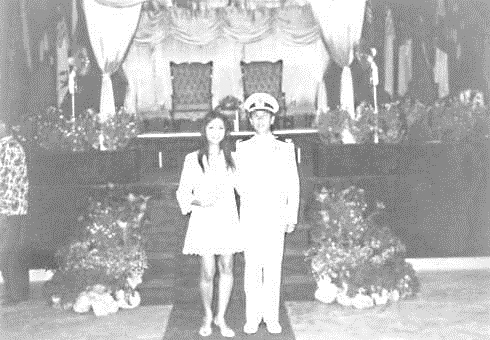

Tet Seong and wife Carolina at the Commissioning Ceremony
1983.
In a short summary Tet Seong’s RMN appointment were as follows:
(1) 1976 – 1977 – Fleet Technical Services Workshop
(2) 1977 – 1980 – KD SRI LANGKAWI
(3) 1981- 1982 – Fleet Technical Services Planning Office
(3) 1981- 1982 – Fleet Technical Services Planning Office
(4) 1982 – 1983 – Port Dickson/KD PELANDUK SD Officer
training
(5) 1984 – 1989 – Fleet Material Command (M&E)
Electrical & Electronic Engineering Officer
(6) 1989 – 1993 – Communications Mindef/Lumut/Kuantan
Project
Upon retirement from the RMN on 30th May 1993, Tet Seong
was employed and was directly involved in the setting up of the installation,
testing and commissioning of Highway Emergency Telephone System.
Tet Seong is currently employed to provide services in the
Inspection, Testing and Commissioning of all Systems on the Ampang LRT
Extension Project and Existing Ampang Line and Ampang Depot.
Lt Col Loo Lee Fum (Retired), Royal Intelligence Corps
T60880
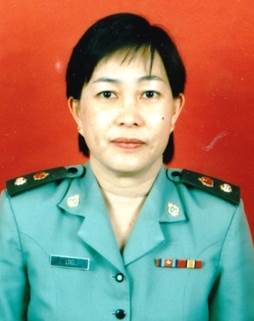
Lt Col Loo Lee Fum (Retired)
Against the supposedly belief (but at times observed as an
easy excuse) on Chinese sons not joining the military, two young 20 year old
aspiring ladies, Loo Lee Fum and Toh Lian Sim @ Siti Linziana braved the odds
to gain a place as pioneers and the first intake for Army lady cadets in 1977,
a profession and field already monopolised and acclaimed by men. Loo, fresh
from school, went through the special Army selection board at the Penang Local
Defence Corps (LDC) prior to joining the Army. Whilst Toh was from Kuala
Terengganu LDC, also fresh from school, went through the same interview
process. All successful candidates (a total of 70 Men and women) from the whole
Peninsular were sent to Tambun, Ipoh for their centralized training. After
months of intensive training, they were commissioned on 7th January 1978 and
subsequently absorbed into the various Corps except for the combatant units in
the Army. Both Loo and Toh were selected to join the Royal Intelligence Corps
due to their education background and ability to speak in multiple dialects and
languages.
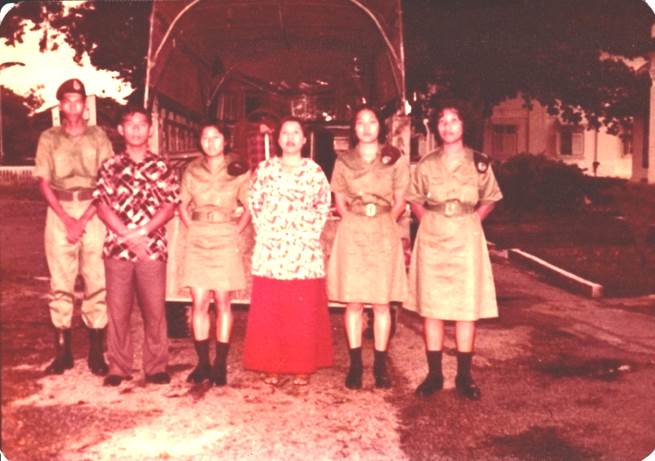
Pioneer Lady Cadets Selected from the Penang Local Defence
Corps in 1977. Seen here - Brig Gen Dato Nurhuda Ahmad (Retired) (3rd from
left) and Lt Col Loo (2nd from right).
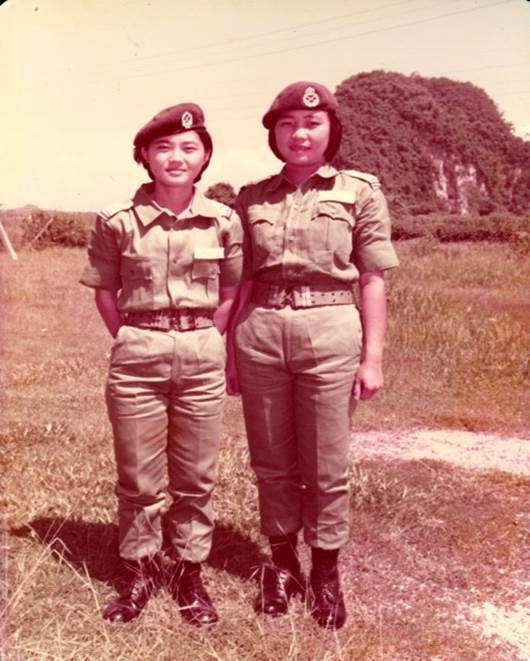
1977 Pioneers - 1st Intake Lady Cadet Officers. Toh Lian
Sim @ Siti Linziana and
Loo Lee Fum.
During her tenure of service, Lt Col Loo Lee Fum, a Kedahan
from Baling, began her career as a staff officer in Military Intelligence
Special Branch (MISB) homed at the Polis Diraja Malaysia (PDRM) Headquarters,
Bukit Aman.
She had also served as Foreign Liaison Officer,
intelligence instructor and Staff Officer in various intelligence units in the
Ministry of Defence. As the desk officer in-charge of Communist Party of
Malaysia (CPM) in Peninsular Malaysia, she has an in-depth knowledge on
organisational structure, tactics and techniques and weaponry system of the
CPM.
Whilst serving as strategic officer in-charge of East Asia
region, she was an adviser on subjects pertaining to politico-military
deployment of both China and Taiwan.
1996 Dr Col Liew (3rd from left) & Loo (1st right) in
Glamoc, Bosnia.
She was the first lady officer cum intelligence officer to
have served in the all important livewire Defence Operations Room (DOR) of the
Armed Forces, overseeing the mobilization of peacekeeping troops to Bosnia
& Herzegovina and furnishing ground intelligence to Malaysian Battalion
(MALBATT) operating there as well as local operations.
On the academic aspect, she holds a diploma in Defence and
Strategic studies from University of Malaya and was a graduate of the Malaysian
Armed Forces Staff College (MTAT) – Commandant’s List in 1993. She rose to the
rank of Lt Col in 2000 and retired in 2008 after 31 years of service.
Mr Loo Yok Tian – a third digression related to
volunteerism and loyalty - it may be prudent for this article to include that
Lt Col Loo’s father, Loo Yok Tian, also played no lesser a role during his
younger days in the deep loyalty that most Malaysian born Chinese have for the
country. Loo Yok Tian (the only son to Mr Lo Khoon and Madam Khoo Peng Lan)
enlisted as a member of Home Guard (Federation of Malaya) on 5th March 1953.
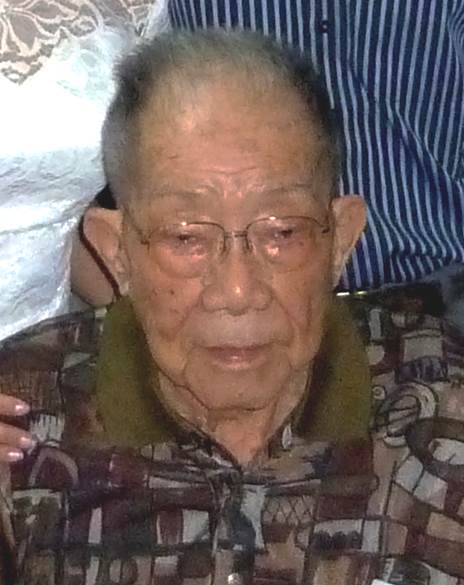
2012 - Loo Yok Tian
For the uninitiated, the Home Guard (Federation of Malaya)
is a volunteer organization that plays a role in controlling security during
the Emergency Period situation in the Federation of Malaya after the Second
World War. During that Emergency Period, the Colonial British controlled
various security forces in Malaya - police, military, Special Constabulary (SC)
and Auxiliary Police (AP) nationally, but they were still hard pressed for a seamless
control in the dire situations lower down within communities. Lt Gen Sir Harold
Briggs, the Operations Director, proceeded to establish a Home Guard team in
1951, a set up similar to the Home Guard (United Kingdom) to close that gap,
however the Malaya version was responsible for protecting villages and risky
areas from communist terrorist sabotages.
This Home Guard team consists of ordinary citizens subject
to the Home Guard Regulations 1951 and 1952. Under this provision, those
between the ages of 18 and 55 may be deployed to become members of the Home
Guard. The teams were established at all levels of the state, district, county
and village, and their members were trained in custody, handling weapons,
tactics and more. With this establishment, the police and military forces could
then focus on launching their main trusts against the abolition communist
operations federally, while the responsibility of controlling the villages,
estates and mines were relegated and handed over to the Home Guard to help out
in tandem.
The goals of the Home Guard were as follows:
(1) Responsible for safety in their own areas
(3) New
Villages - the Home Guard assisted the military, the police and the SC – in
checking identification of residents and the control of food, clothing,
medicinal and weapon supplies, to ensure that they did not reach the hands of
the communists.
Generally, since its establishment in 1951 until 1958, it
is believed that the Home Guard team had killed 221 communist terrorists and
injured another 110. Also 123 communist terrorists had surrendered to them. The
Home Guard team was officially disbanded on 1 July 1959.
812217 LK1 TMK Soon Yew Fook @ Rudin Soon Abdullah RMN
Soon Yew Fook born on 2nd June 1963 is the eldest son of
Soon Boon Yin. Boon Yin is the younger first cousin to Boon Leong and Boon
Sooi, making Yew Fook, himself a 6th Generation Soon, a second cousin to the
rest of the 6th Generation Soon’s mentioned earlier in this article.
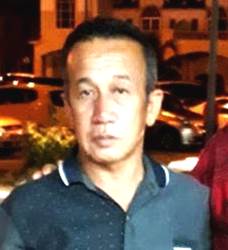

LK1 TMK Soon Yew Fook @ Rudin Soon Abdullah.
After completing his SPM, the Kedah born Yew Fook enlisted
on 1st January 1982 in the RMN and he was slotted into the Technical Branch. He
spent the next 13 years in RMN as an Able Bodied Mechanic Engine (ABME) and
completed his service on 1st January 1995.
In all his 13 years of service, and apart from short breaks
for trainings, Yew Fook had spent most of his services sailing onboard KD PAUS,
KD SERANG, KD GANAS, KD MAHAWANGSA. He had completed his tour of duties at the
Lumut Pump House.
Yew Fook, after leaving the services is employed as a
Security Executive till this day.
388673 Kenneth Soon Pow Lee (RMC)
Marine Engineer Kenneth Soon.
Kenneth Soon was born on 28th Feb 1982. He is the eldest
son to Lt Col Loo Lee Fum (Retired) and Lt Soon Tet Leong RMN (Retired). He is
a 7th Generation Soon. He received his early education in Sekolah Rendah
Kebangsaan, Jalan Gurney, Victoria Institution before he was admitted into the
RMC starting at Form 2. His entry into the RMC was on 14th Dec 1995.
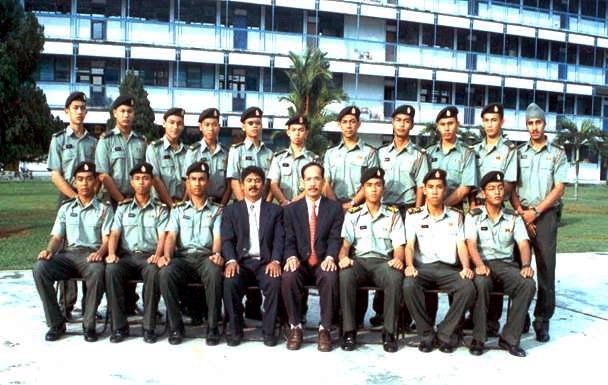
Kenneth (Rear 2nd left) RMC
Sungei Besi 1996.
After the RMC, he was offered a full scholarship from the
Malaysian International Shipping Corporation (MISC). Under this scholarship, he
acquired his diploma in Marine Engineering graduating from the Malaysian
Maritime Academy (ALAM). Kenneth Soon’s service in the Merchant Navy is truly
another form of uniformed services.
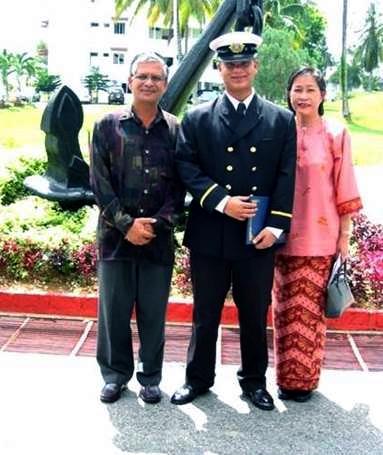
Kenneth under Training and Passing Out Akademi Laut Maritim
(ALAM)
Through the initial diploma he subsequently obtained his 3rd Class unlimited Certificate of Competency (COC) and started working for MISC as a marine engineer in their chemical fleet. He worked the first six years of his career exclusively in chemical tankers. Kenneth then proceeded to take his 1st and 2nd Class combined course and had a change in career as he then started in oil and gas sectors in the Anchor Handling Tug Supply (AHTS) and Multi Purpose Supply Vessel (PSV). He has been in the oil and gas industry for the last decade and most of those years were exclusively under vessels chartered by SARAWAK SHELL BHD. Both his promotions to Second Engineer and Chief Engineer were all approved by SHELL and his promotion to Chief Engineer was in fact recommended by SHELL to the company.
Kenneth is currently employed by the Abu Dhabi Petroleum
Ports Operating Company (IRSHAD) which is part of the Abu Dhabi National Oil
Company (ADNOC) as a Chief Engineer for Marine Tugs.
Kenneth upholds and one can tell from his seaman book
record, loyalty is a trait instilled in him since his days in the Royal
Military College. In his 14 years as a seaman he has only worked the bulk of it
in 2 companies.
388731 Lionel Soon Pow Yik (RMC)
Lionel Soon Pow Yik, born on 28th February 1986, is the
younger son of Lt Col Loo Lee Fum (Rtd) and Lt Soon Tet Leong RMN (Rtd). Lionel
grew up in a military environment. He was exposed totally to a military culture
for the better part of his upbringing. Though born in Penang, he had spent
almost all his entire childhood life in the confines of the Ministry of
Defence’s protected surroundings growing up in the Officers Married Quarters,
Jalan Padang Tembak, Kuala Lumpur. He even started his first day in
Kindergarten riding in a military vehicle to pre-school, an unaccompanied “anak
askar” they would say. Lionel received his early education in Sekolah Rendah
Kebangsaan, Jalan Gurney, Sekolah Menegah Kebangsaan, Taman Melawati before he
was admitted to the RMC starting in Form 2 Secondary education. His entry into
the RMC was on 14th Dec 1999.
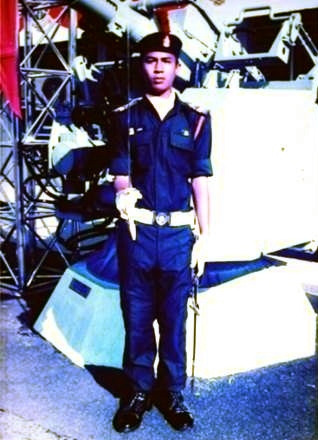

Lionel Passing Out from RMC 2003
In the RMC from 14th December 1999-2003 he had completed
his PMR and SPM examinations and certifications successfully.
Apart from the academic studies necessity, they were also provided with basic military exposures, experiences, basic weapons training and handling, compass marching and map reading.
He rose up and eventually achieved the rank of Junior Under
Officer (JUO) in 2003. While in college, he participated actively in tennis and
volleyball. He was also a college debate representative.
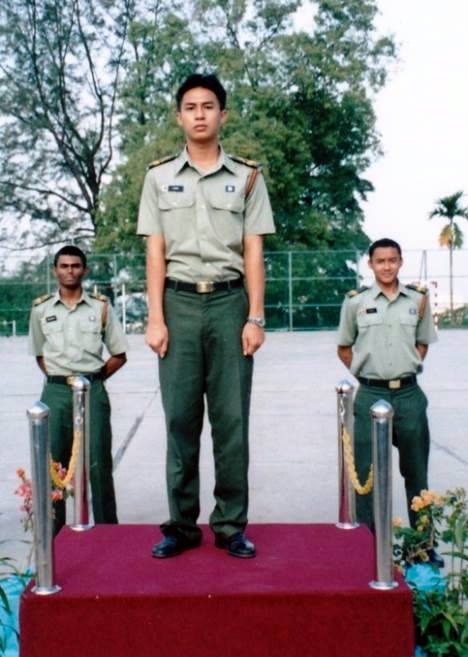
JUO Rank Holder 2003
The quality of education and training in the RMC facilitated Lionel to be directly admitted into Universiti Tenaga Nasional (UNITEN) after his Form 5 to undergo first the Matriculation (Pre-University) phase before finally pursuing his full degree course. Lionel completed his university education when he passed out from UNITEN with a Bachelor Degree (B.Eng. Hons) in Electrical and Electronics Engineering in the 2003 to 2008 period. He is today registered with the Board of Engineers Malaysia (Registration no: 67418A).
Lionel joined the Oil and Gas Industry after graduation
in 2008. He today has acquired experienced in project management for process
and pipeline services with extensive experience in In-Line Inspections
Operations, project management and coordination. His area of Specialties, the
current vocation, is fulfilling the role of Project Manager of Baker Hughes
Process and Pipeline Services in In-Line Inspection (ILI); Pipeline
Pre-Commissioning, Project Engineering and Project Management.
CONCLUSIONS
Firstly, this article has narrated a typical Malaysian
history regarding migration, homeland, ancestry, loyalty and uniform services
(which incidentally also included the government services, army, navy, air
force, boys’ wing, women and voluntary bodies) and of course a gainful life
after serving the Armed Forces.
Secondly, the RMC was established with the objective of
preparing young Malaysians to become Officers in the Malaysian Armed Forces
hold office in the higher divisions of public service and become leaders in the
professional, commercial and industrial life of the country. The RMC episodes
quoted are typical success stories.
It therefore hurts when people or politicians insinuate
that the Chinese or other races are not patriotic. It hurts when people or
politicians insinuate that Chinese or other races just do not want to join the
armed services. It hurts when people or politicians insinuate that the Chinese
or other races only want to serve in the upper echelon of leadership. It hurts
when people or politicians insinuate that the Chinese or other races shy away
from the Armed Forces because of the low salaries offered. This article
countered all such uncalled for sweeping statements. The Soon story in fact
depicts all the good ingredients of citizenry, loyalty and love for the
homeland.
And, to add more in support to the above paragraph,
although this may be the first written account of the Soon family from Bukit
Mertajam, readers must surely understand that we are truly not just the only
family to have a long list of descendants in this country, nor are we the only
ones to have a number of family members serving our nation and homeland
loyally, whether or not in the uniforms. There are many other unwritten or
untold stories along similar lines. Of the cuff amongst Chinese and Eurasian
families and in uniforms that I can recall – there are the Thong, Yuen, Kwong,
Rodrigues, Stevensons and Lai families, just to name a few (and it is because
one can easily recall the illustrious surnames of these families). Surely this
bunch of people and thousands more cannot be simply labelled unpatriotic.
Truly, people and politicians are barking up the wrong
tree, there must be more reasons than the eye can see on why there is a lack of
Chinese or other races wanting to serve in the uniform these days, after all
many (pre and post Independence) had already given their lives in doing so. As
to the real why – a soul searching exercise related to disappointments (the
real picture) from those that had served would be necessary.
And finally, to the youths out there, please do not give up
and also please take heart that there is life and there are success stories
during and after serving the Armed Forces. In fact the Armed Forces training
instil loyalty, integrity, management, discipline and intellectuality, which
are well sought after ideals in most civilian environments.
Compiled and Written by:
Lt Soon Tet Leong RMN (Retired)
14 Aug 18
MY SPECIAL GRATITUDE AND APPRECIATION TO LIEUTENANT SOON TET LEONG RMN (RETIRED) FOR HIS HISTORICALLY AND SENTIMENTALY VALUABLE ARTICLE ABOUT HIS FAMILY'S COMMITMENT TO THE NATION




We are all Malaysian.
ReplyDeleteProud to be apart. And proud also to my dad rudin soon abdullah
ReplyDelete